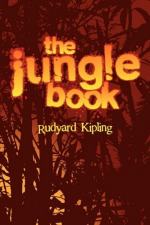Shiv, who poured the
harvest and made the winds to blow,
Sitting at the doorways
of a day of long ago,
Gave to each his portion,
food and toil and fate,
From the King upon the
guddee to the Beggar at the gate.
All
things made he—Shiva the Preserver.
Mahadeo! Mahadeo!
He made all—
Thorn for the camel,
fodder for the kine,
And mother’s heart
for sleepy head, O little son of mine!
Little Toomai came in with a joyous tunk-a-tunk at the end of each verse, till he felt sleepy and stretched himself on the fodder at Kala Nag’s side. At last the elephants began to lie down one after another as is their custom, till only Kala Nag at the right of the line was left standing up; and he rocked slowly from side to side, his ears put forward to listen to the night wind as it blew very slowly across the hills. The air was full of all the night noises that, taken together, make one big silence—the click of one bamboo stem against the other, the rustle of something alive in the undergrowth, the scratch and squawk of a half-waked bird (birds are awake in the night much more often than we imagine), and the fall of water ever so far away. Little Toomai slept for some time, and when he waked it was brilliant moonlight, and Kala Nag was still standing up with his ears cocked. Little Toomai turned, rustling in the fodder, and watched the curve of his big back against half the stars in heaven, and while he watched he heard, so far away that it sounded no more than a pinhole of noise pricked through the stillness, the “hoot-toot” of a wild elephant.
All the elephants in the lines jumped up as if they had been shot, and their grunts at last waked the sleeping mahouts, and they came out and drove in the picket pegs with big mallets, and tightened this rope and knotted that till all was quiet. One new elephant had nearly grubbed up his picket, and Big Toomai took off Kala Nag’s leg chain and shackled that elephant fore-foot to hind-foot, but slipped a loop of grass string round Kala Nag’s leg, and told him to remember that he was tied fast. He knew that he and his father and his grandfather had done the very same thing hundreds of times before. Kala Nag did not answer to the order by gurgling, as he usually did. He stood still, looking out across the moonlight, his head a little raised and his ears spread like fans, up to the great folds of the Garo hills.
“Tend to him if he grows restless in the night,” said Big Toomai to Little Toomai, and he went into the hut and slept. Little Toomai was just going to sleep, too, when he heard the coir string snap with a little “tang,” and Kala Nag rolled out of his pickets as slowly and as silently as a cloud rolls out of the mouth of a valley. Little Toomai pattered after him, barefooted, down the road in the moonlight, calling under his breath, “Kala Nag! Kala Nag! Take me with you, O Kala Nag!” The elephant turned, without a sound, took three strides back to the boy in the moonlight, put down his trunk, swung him up to his neck, and almost before Little Toomai had settled his knees, slipped into the forest.




